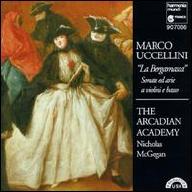McGegan was born on January 14, 1950, in Sawbridgeworth, Hertfordshire, England. He studied piano at London's Trinity College of Music and learned to play the flute while he was there but entertained no special desire to study historical performance. When he entered Corpus Christi College in Cambridge, however, one of the courses required for a music degree was Professor Nicholas Shackleton's acoustics class. This course often met in the professor's home, which contained both a large collection of 18th century wind instruments and a tenant named Christopher Hogwood. Hogwood, of course, was then one of the leading lions of the period-instrument Baroque movement in England, so McGegan could not have been in a better position to learn about it. Although he had been studying 20th century music, one day he picked up a Baroque wooden flute and never looked back. During the 1970s, McGegan became one of the bright lights of England's starry period-instrument scene, playing the flute, harpsichord, and fortepiano with all the major period instrument groups in England, especially Hogwood's Academy of Ancient Music. He became director of early music at the Royal College of Music in London in 1976.
In 1979, McGegan made the fateful decision to accept a three-month artist-in-residence position at Washington University in St. Louis. His teaching and performance caused quite a stir there, and numerous renewals of his initial term followed. In 1985, McGegan became music director of the Philharmonia Baroque Orchestra, which had been a players' cooperative without a leader. The ensemble still places a premium on collaboration and creativity under McGegan's direction. It has become the finest period-instrument group in America and one of the finest in the world since McGegan took it over, making numerous recordings under his direction.
One of the international positions this very busy conductor held was as artistic director of the Gottingen Handel Festival from 1991 until 2011, the oldest festival for Baroque music in the world. He has also spread the ideas of historically informed practice in his work with groups around the world, such as Hungary's Capella Savaria, the Cleveland Orchestra, and the Hong Kong Philharmonic, among many others. He has also worked with opera companies, including Covent Garden and San Francisco. McGegan also founded the Arcadian Academy, a chamber offshoot of the Philharmonia Baroque, and has served as the Baroque series director for the Saint Paul Chamber Orchestra and as an advisory board member for the University of Maryland Handel Festival and London's Handel House. In his pursuit of reviving Baroque works, he's collaborated with dancer Mark Morris to present Rameau's Platée at the Edinburgh Festival and Handel's L'Allegro at Ravinia and the Mostly Mozart Festival in New York.
Despite, or perhaps because of, his academic credentials and background in period performance, McGegan's performances exemplify joy and fun rather than sober scholarship. He has compared the Philharmonia Baroque to a "jazz band" in terms of its ability to play together and play with spirit, and the comparison rings true when listening to the group, or, indeed, any of McGegan's performances. In 2019, he was heard on the BIS album Josef Myslivecek: Complete Music for Keyboard, with pianist Clare Hammond. McGegan remained in his role with the Philharmonia Baroque until 2020 when he stepped into his new role as music director laureate. In 2022, McGegan conducted the SWR Symphonieorchester on a recording of Mozart's violin concertos with violinist Gil Shaham. ~ Andrew Lindemann Malone & Keith Finke, Rovi












